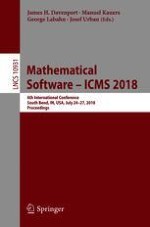2018 | OriginalPaper | Buchkapitel
Machine Learning for Mathematical Software
verfasst von : Matthew England
Erschienen in: Mathematical Software – ICMS 2018
Aktivieren Sie unsere intelligente Suche, um passende Fachinhalte oder Patente zu finden.
Wählen Sie Textabschnitte aus um mit Künstlicher Intelligenz passenden Patente zu finden. powered by
Markieren Sie Textabschnitte, um KI-gestützt weitere passende Inhalte zu finden. powered by
